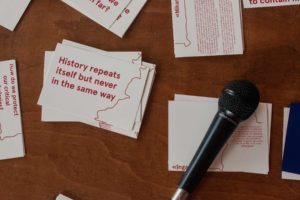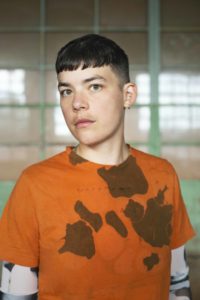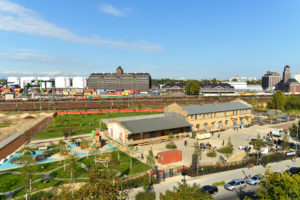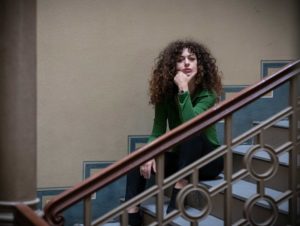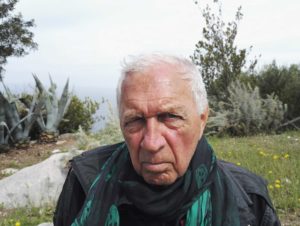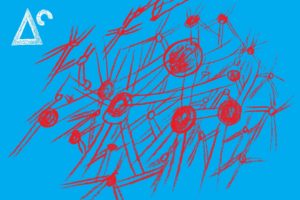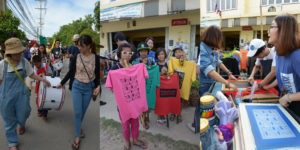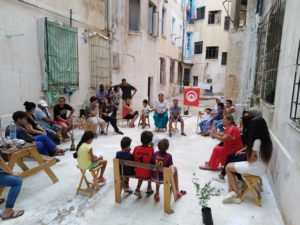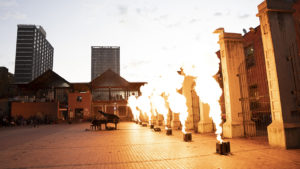Conceived as a nomadic program for exchange between artists and thinkers from Tunis, Tunisia, Baghdad, Iraq, and Paris, France, Siwa platforme has taken root in the mountainous region of Gafsa, Tunisia. Redeyef, in one of the world’s largest phosphate basins, remains one of the most marginalized towns in Tunisia. Its inhabitants are mainly miners and unemployed youth, with a strong trade unionist tradition. Precarious living conditions contributed to a spirit of revolt that gained momentum in 2008, anticipating the worldwide uprisings of 2011.
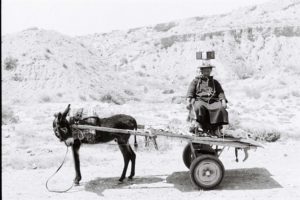
A trip to Redeyef with Siwa, 2015, photo: Fakhri El Ghazal
Since 2011 the group, composed of Yagoutha Belgacem, Arafat Sadallah, Jean-Pierre Han, and Chems Zitouni, has worked with artists from France and Tunisia, and the inhabitants of Redeyef. Through a collaborative renovation of L’Économat, the mining settlement’s colonial general warehouse, they turned it into a laboratory for activities, breathing life into possible common futures. Through a collective proposal of interventions, installations, images, drawings, and performances, their work for documenta fifteen bridges the Fridericianum and the Économat in Redeyef.
Haythem Zakaria’s installation draws a topography of the luminous desert landscape, while Mohammed Znaidi tells stories of the desert. Radio transmitters broadcast recordings of inhabitants of Redeyef narrating a scorching desire to burn national borders. In the sound installation Nantes – Redeyef (2022), Guellaa, a rapper from the region, recounts his perilous journey over the Mediterranean to France. While the musician Loup Uberto records and transfigures the traditions of song and poetry from Redeyef, Okacha Ben Salah, a young filmmaker, paints a filmic portrait of the town. Yagoutha Belgacem and Marianne Dautrey propose a visual montage of the archives of the ten years of Siwa in Redeyef and make audible the voice of the choreographer-dancer Imen Smaoui, who speaks of the freedom of the bodies of the people of Redeyef and their relationship to the space of the desert.
Paintings close to concrete art, made by the inhabitants of Redeyef, collected by Jean-Michel Diaz, form the bed of another thorny Redeyef story, facing the photographs of Fakhri El Ghezal. Hamouda Jarrar recounts the story of his famous grandfather, El Hedi Ben Salem, who grew up in Redeyef and worked with German filmmaker Rainer W. Fassbinder. Muntasser, spokesperson for the youth of Redeyef, is present in Kassel as a kind of ambassador. Stories—and ways of telling them— form the material bridge between Redeyef and Kassel, built by Yagoutha and her curatorial team. Bypassing tenacious global frontiers, Siwa challenges inhabitants of Redeyef to host the hospitable space created at documenta fifteen.
Invited participants
Marwan Akrouti
Lassad Beldi
Yagoutha Belgacem
Mouna Belhouchet
Noura Ben Ali
Samir Ben Boubaker
Haythem Ben Bousaha
Salim Ben Mohamed
Okacha Ben Salah
Sophie Bessis
Malek Bouaoni
Laid Bouoni
Laurence Chable
Houcine Chraiti
Marianne Dautrey
Ali Dhahri
Jean Michel Diaz
Fakhri El Ghazel
Tahar Ezzeddini
Houcine Ezzedini
Mohamed Amin Ezzedini
Jean Pierre Han
Hamouda Jarrar
Muntasser Kramti
Mohamed Labidi
Matheiu Lontanaza
Atef Maatallah
Fatima Machouch
Rochdy Machouch
Abdelhamid Mansouri
Aicha Mansouri
Helmi Mbarki
Arafat Sadallah
Imen Smaoui
Saad Tabbabi
Francois Tanguy
Nadia Tazi
Loup Uberto
Rai Uno
Farid Yahyaoui
Haytham Zakaria
Chemssedine Zitouni
Mohamed Znaidi
Salah Znaidi
